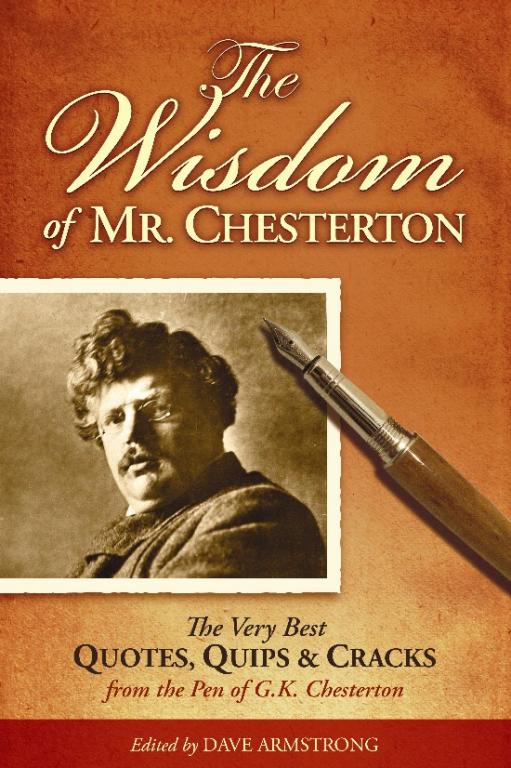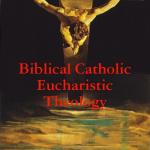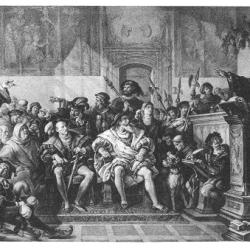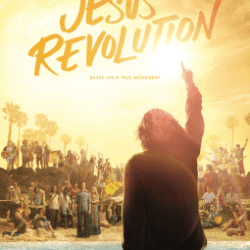
[see further book and purchase information; available for as low as $3.99)
[edited, with my brief comments, in 1991; later published in the Coming Home Newsletter, Sep. / Oct. 1996]
We will trace the course of Chesterton’s spiritual pilgrimage, culminating in his conversion to Catholicism in 1922 (largely in his own words):
*****
A convert . . . must try to retrace his steps out of that shrine back into that ultimate wilderness . . . It is a thing exceedingly difficult to do . . . The difficulty was expressed to me by another convert who said, “I cannot explain why I am a Catholic, because now . . . I cannot imagine myself as anything else.” (The Catholic Church and Conversion, New York: Macmillan, 1926, 27)
As early as 1911 Chesterton had written:
I think I have known intimately by now all the best kinds of Anglicanism, and I find them only a pale imitation. (Michael Ffinch, G. K. Chesterton: A Biography, San Francisco: Harper & Row, 1986, 201)
He told a priest and friend that “he had made up his mind to be received into the Catholic Church, and that he was only waiting for Frances [his wife] to come with him, as she had led him into the Anglican Church out of Unitarianism.” (Ffinch, 201)
In 1920, he wrote to a friend:
I want to consider my position about the biggest thing of all . . . I know I have your sympathy; and please God, I shall get things straight . . . Frances, to whom I owe much of my own faith. If her side can convince me, they have a right to do so; if not, I shall go hot and strong to convince her. (John A. O’Brien, Giants of the Faith, Garden City, New York: Doubleday Image, 1957, 213-214)
During World War I, he had written in a notebook:
Catholicism necessarily feels for Protestantism not the superiority a man feels over sticks and straws, but that he feels over clippings of his hair and nails. She feels Protestantism not merely as something insufficient, but something that would never have been even that, but for herself. (Ffinch, 275)
Chesterton saw Catholicism as the only tenable faith bearing the (Nicene Creed) characteristics of “one, holy, catholic, and apostolic.” He detested the fast-creeping theological liberalism of Anglicanism:
The insecurity I felt in Anglicanism was typified in the Lambeth Conference . . . the crowd there cheered all references to the Pope, and laughed at every mention of the Archbishop of Canterbury. It’s a queer state of things. . . .
We do not want, as the newspapers say, a Church that will move with the world. We want a Church that will move the world . . . It is by that test that history will really judge, of any Church, whether it is the real Church or no. (Ffinch, 277)
He wrote to his mother after his conversion:
The fight for the family and the free citizen and everything decent must now be waged by the one fighting form of Christianity . . . I have thought this out for myself and not in a hurry of feeling . . . I believe it is the truth. (Ffinch, 289)
Chesterton’s friend Maurice Baring, himself a convert to Catholicism, wrote to him upon hearing the news:
Nothing for years has given me so much joy . . . Space and freedom: that was what I experienced on being received; that is what I have been most conscious of ever since. It is the exact opposite of what the ordinary Protestant conceives to be the case . . . It is perhaps the only act in my life, which I am quite certain I have never regretted. Every day I live, the Church seems to me more and more wonderful . . . the Sacraments more and more solemn and sustaining . . . her liturgy . . . her decisions in matters of Faith and Morals more and more excellent and profoundly wise and true and right . . . There I have found Truth and reality and everything outside Her is to me compared with Her as dust. (O’Brien, 219-220)
“GKC” wrote in 1923 about some of the reasons for his recent conversion:
I believe one of my strongest motives was mixed up with the idea of honour. I feel there is something mean about not making complete confession and restitution after a historic error and slander . . . Another quality that impresses me is the power of being decisive first and being proved right afterwards. This is exactly the quality a supernatural power would have; and I know nothing else in modern religion that has it . . . (Ffinch, 291-292)
The difficulty of explaining why I am a Catholic, is that there are 10,000 reasons all amounting to one reason: that Catholicism is true. (O’Brien, 231)
Biographer John A. O’Brien remarks:
The announcement of G.K.’s conversion stirred widespread interest throughout the English-speaking world. It was akin to that which was aroused by the entrance of Newman into the Church. (O’Brien, 232)
He goes on to speak of Frances’ change of heart:
In 1926 Frances Chesterton joined her husband at the communion rail and her joy in the practice of her newfound faith was as complete as his. She came in as a result of her own independent study . . . (O’Brien, 234)
Chesterton wrote eloquently, as always, in his book on Catholic conversion:
The Church is a house with 100 gates; and no two men enter at exactly the same angle . . . I accepted for a time the borderland of Anglicanism; but only on the assumption that it could really be Anglo-Catholicism . . . I did not start out with the idea of saving the English Church, but of finding the Catholic Church. (The Catholic Church and Conversion, New York: MacMillan, 1926, 30-31)
It is not really a question of what a man is made to believe but of what he must believe; what he cannot help believing . . . He cannot treat the Church as a child when he has discovered that she is his mother. (Ibid., 44)
The convert does not in the least abandon investigation or even adventure . . . For the estate is not only a formal garden . . . there is plenty of hunting and fishing on it . . . People have confused the natural remarks of converts, about having found moral peace, with . . . mental inaction . . . To become a Catholic is not to leave off thinking, but to learn how to think . . . The Catholic convert has for the first time a starting-point for straight and strenuous thinking . . . a way of testing the truth . . .
Nothing is more amusing to the convert . . . than to hear the speculations about when or whether he will repent of the conversion . . . The outsiders . . . think they see the convert entering with bowed head a sort of small temple which they are convinced is fitted up inside like a prison, if not a torture-chamber . . . They do not know that he has not gone into the inner darkness, but out into the broad daylight. (Ibid., 85-87)
He lauds the place of intellect in Catholicism in another book:
A thinking man can think himself deeper and deeper into Catholicism, and not deeper and deeper into difficulties about Catholicism . . . Conversion is the beginning of an active, fruitful, progressive and even adventurous life of the intellect . . . To exalt the Mass is to enter into a magnificent world of metaphysical ideas, illuminating all the relations of matter and mind, of flesh and spirit, of the most impersonal abstractions as well as the most personal affections . . . It is precisely the dogmas that are living, that are inspiring, that are intellectually interesting. (The Thing, New York: Sheed & Ward, 1929, 212-213)
***
Related Reading:
Why I Returned to the Catholic Church; Including a Searching Examination of Various Flaws and Errors in the Protestant Worldview and Approach to Christian Living (Al Kresta) [transcript of his talk in my home, 26 April 1992]
Fifteen Conversion Stories (in my book, Catholic Converts and Conversion: 2013)
Cardinal Newman’s Conversion Odyssey, in His Own Words (September 1839 to December 1845) [3-19-15] [see also the Spanish version (shorter version) ]
Cardinal Newman’s Conversion Agonies: Jan. 1842 to Feb. 1844
Catholic Conversion: Classic Analyses (Chesterton, Belloc, Pelikan) [1991]
Catholic Conversion: Random Thoughts & Reflections [5-13-03]
Catholic Converts’ Qualms: Mariology, Formal Worship, Etc. [2-11-04]
Conversion to Catholicism: Reflections on its Complexity [9-7-05]
Augustine’s Confessions: Model for Conversion Stories [6-10-09]
Dialogue: Do Vatican II & Ecumenism Discourage Converts? [Sep. 2009]
“Why Convince Protestants to Become Catholics?” [4-30-15]
Should Catholics Try to Persuade Protestants? [5-25-16]
Is Conversion to Catholicism Mainly Emotional or “Doctrinal”? [9-11-04]
Catholic Conversion: Some Silly Protestant “Analyses” [3-6-04, 3-30-04, and 9-26-05]
James White’s Top Ten Questions for “Romanist” Converts Answered [9-4-07]
Malcolm Muggeridge & His Conversion to Catholicism [1991; published by The Coming Home Newsletter, March / April 1997]
***













